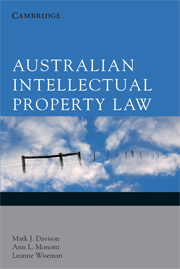Book contents
- Frontmatter
- Contents
- Preface
- Acknowledgements
- Table of statutes
- Table of cases
- 1 Introduction
- 2 Passing off
- 3 Registered trade marks
- 4 Exploitation of registered trade marks
- 5 Copyright: Introduction
- 6 Subsistence of copyright
- 7 Authorship and first ownership, nature of the rights and duration
- 8 Exploitation, infringement and defences
- 9 Moral rights, performers' rights and circuit layouts
- 10 Designs
- 11 Equitable doctrine of breach of confidence
- 12 Patents for inventions: introduction
- 13 Patents for inventions: validity
- 14 Patents for inventions: allocation of rights and ownership, the Register and dealings
- 15 Patents for inventions: exploitation, infringement and revocation
- 16 Plant breeder's rights
- 17 Remedies and miscellaneous issues
- Appendix
- Index
11 - Equitable doctrine of breach of confidence
- Frontmatter
- Contents
- Preface
- Acknowledgements
- Table of statutes
- Table of cases
- 1 Introduction
- 2 Passing off
- 3 Registered trade marks
- 4 Exploitation of registered trade marks
- 5 Copyright: Introduction
- 6 Subsistence of copyright
- 7 Authorship and first ownership, nature of the rights and duration
- 8 Exploitation, infringement and defences
- 9 Moral rights, performers' rights and circuit layouts
- 10 Designs
- 11 Equitable doctrine of breach of confidence
- 12 Patents for inventions: introduction
- 13 Patents for inventions: validity
- 14 Patents for inventions: allocation of rights and ownership, the Register and dealings
- 15 Patents for inventions: exploitation, infringement and revocation
- 16 Plant breeder's rights
- 17 Remedies and miscellaneous issues
- Appendix
- Index
Summary
Introduction
Creation and open transmission of ideas and information have long been regarded as important features of a democratic society. However, there are many occasions where a person will want to communicate information to another in confidence on the understanding that the information is not further disseminated or used without consent. This may arise in the context of business, government or personal relationships. The value of information in each type of context will differ. Businesses and corporations are usually concerned to protect information that has some commercial value. It may be an invention for which a patent is to be sought, details of a business strategy or secret processes or recipes. Governments need to protect their ability to make decisions on sensitive issues. Individuals are usually concerned about protection of reputation and privacy. In the case of indigenous groups, their concern is to protect the secrets of their tribal group.
There is no discrete body of law that protects confidential information because the circumstances differ widely in which obligations are imposed. Duties of confidence may be relevant in many different legal contexts, including that of protection of government secrets, business secrets and personal privacy, and requests for information under the relevant freedom of information legislation. Obligations also arise under the doctrine of legal professional privilege, but this type of confidence must be distinguished from confidential information which is the source of the plaintiff's rights. Specific duties may be owed by people who have statutory powers to obtain information, and issues of confidentiality can arise in connection with arbitration proceedings.
- Type
- Chapter
- Information
- Australian Intellectual Property Law , pp. 340 - 376Publisher: Cambridge University PressPrint publication year: 2008



